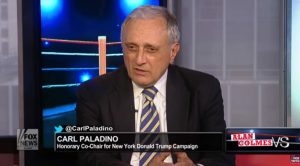BY MATTHEW RICCHIAZZI
Last Monday, Carl Paladino gave an interview to BBC Radio 4’s Today program, an influential platform in the United Kingdom. The same day his interview was reported in The Guardian.
“I think you describe correctly the offense which is, if you don’t pick up your part, as was agreed to many years ago, then there’s going to be a consequence,” he said. “We don’t know what that consequence will be, but I think most Americans are in favor of that. They think everybody should pay their fair share. There’s no reason why the United States of America has to put up with the nonsense of caring for the defense and the security of a country that doesn’t pick up its fair share.”
When he was asked if the Trump administration would insist on a reduction in NATO’s status or role, Paladino replied: “I don’t think we’re changing the status of NATO, we’re enforcing the agreement as it was originally drawn out. Enforcing the agreement is the intent.”
“It’s not to scare people. But they should, just as the United States has accommodation for its defense budget, these other countries are going to have to start making accommodation themselves. In other words, times are changing.”
Later that same day, UK Foreign Secretary Boris Johnson arrived in Brussels, where he urged European nations to spend 2% of GDP on defense, as required by NATO, echoing Paladino’s key demand.
“It’s a good thing if everyone steps up to the plate and spends a bit more on defense themselves. One of the great things about our government is that we do spend 2% of GDP on defense,” Johnson told The Telegraph. “It’s important when you’re setting up these EU structures that they should be complementary with NATO. You shouldn’t undermine the fundamental security architecture that’s looked after us for the last 70 years.”
It is clear that Paladino – based much on his recruitment of the President Elect as a candidate – has earned himself enormous influence, which some have speculated could lead to a cabinet appointment.
Paladino was at the genesis of the Trump candidacy
Following his unlikely 2010 gubernatorial bid, Paladino embarked upon the task of recruiting Donald Trump to run for Governor. In many ways the two men were similar: real estate developers who were politically astute, in large part because of the entrenchments of their industry.
Paladino took many trips to New York City to meet with the Midtown businessman, and with political operative Mike Caputo, attempted to woo him into the race with a strategy to defeat incumbent Andrew Cuomo. Trump would come to Western New York to entertain the idea, even helping local Republicans fundraise, but ultimately declined to seek the office.
Instead, Paladino convinced Trump to seek a higher office.
Paladino sees the nation’s geopolitical predicament through the lens of the Rust Belt – colored by the collapse of America’s manufacturing industry and the boldly unfilled promises that accompanied Clintonian-era promises of free trade.
It is no small coincidence that the cornerstone of Trump’s candidacy is built on Rust Belt discontent and his willingness to throw off the “free trade” agreements that have decimated domestic manufacturing. Trump’s appeal, from the very beginning, was to the same constituency that Paladino appealed to so heavily in 2010.
Those voters formed the genesis of Trump’s candidacy for President.
That Trump would support cutting income taxes; reducing the corporate tax to 15%; eliminating the tax on repatriating funds from abroad; offer tax credits for industrial modernization; repeal existing trade agreements; and repeal Obamacare, with its costly mandates and penalties; resonated strongly with working class voters, who were mostly interested in work and a different economic direction than the stagnating policies of the last eight years.
His opponent – Hillary Clinton – served as the Senator from New York for eight years, carpet bagging her way into office with promises to create 200,000 new jobs in Upstate that never materialized. Her husband pushed for NAFTA – the dirtiest of five-letter words in most parts of the Midwest – and passed other legislation that sold out factories in Buffalo for Wall Street traders in Manhattan.
It made for a visceral contest, with broad swaths of voters offended by the supposed (but actually asinine) relevance of Clinton’s gender, her often two-faced policy positions, and her alleged (seemingly obvious) criminality.
Culture, not just policy
In many ways Trump’s candidacy was a rejection of the ‘pussification’ of America – a process of social engineering that emasculates white men with racism masked as academics, and commonly peddled as a liberal arts education. That indoctrination, predicated on a liberal ideological posture that preposterously indicts whiteness, is a particularly pronounced form of racism that has inflamed race relations, particularly emboldened during the Obama administration.
Clinton’s supporters call it misogyny. They argue that her mere presence suggests that women of her privilege can treat working-class men with disrespect – she dismisses Trump’s supporters as racist, sexist, homophobic, or xenophobic – provoking an instinctive backlash among men who resent the power structures of a liberal, dominating elite.
Manly dignity is a big deal for working men.
Trump promises a world free of political correctness, where men can be men, unshackled with the burdens of crippling taxes and ivory tower regulations. Working-class men’s wages hit the skids in the 1970’s era of industrial restructuring; the 1990’s era of free trade and the collapse of domestic manufacturing; and the Great Recession, caused by predatory lending and industry excess.
In response, Democrats have ignored – perhaps even disdained – this blue collar constituency of grit and pride. That has forced the pendulum swing of politics with more angrily reactionary tones.
But that’s how pride works: most men, like most women, seek to fulfill the ideals they’ve come of age with. For many blue-collar men, all they’re asking for in a Trump presidency is the basic human dignity that has been central to America’s promise their entire lives.
The Democrats’ solution? This month, The New York Times published an article advising men with high-school educations to take “pink-collar” jobs. Pink collar references service industry jobs historically dominated by women including bank tellers, waitresses, massage therapists, secretaries, nurses and retail clerks.
Some say that kind of elitism only fuels class anger.
Paladino, for his part, has earned the thanks and praise of a broad swath of the populace that has been victimized by a liberal establishment built on their vilification.






















